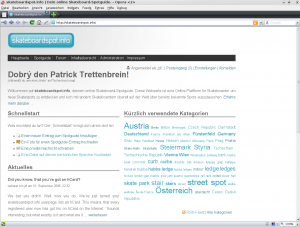Browser Configuration/Opera/fr: Difference between revisions
ChristianW (talk | contribs) Created page with "Ouvrez '''Opera''' et allez sur le lien suivant :" |
ChristianW (talk | contribs) Created page with "{{Note/fr|1=Ce tutoriel est écrit pour Opera 10 ou version ultérieure. Assurez-vous que vous utiliser l'icône de thème par défaut de Plasma, Oxygen, car l'habillage du pr..." |
||
| Line 2: | Line 2: | ||
This tutorial explains how to configure '''Opera''' so that it will blend with your '''Plasma''' applications. To do this, we'll need to install the ''Opera Oxygen Project skin'', set '''Opera''' to use your chosen Plasma Desktop scheme, and change '''Opera's''' default fonts to the ones which KDE uses. | This tutorial explains how to configure '''Opera''' so that it will blend with your '''Plasma''' applications. To do this, we'll need to install the ''Opera Oxygen Project skin'', set '''Opera''' to use your chosen Plasma Desktop scheme, and change '''Opera's''' default fonts to the ones which KDE uses. | ||
{{Note|1= | {{Note/fr|1=Ce tutoriel est écrit pour Opera 10 ou version ultérieure. Assurez-vous que vous utiliser l'icône de thème par défaut de Plasma, Oxygen, car l'habillage du projet Oxygen d'Opera utilise les icônes de Oxygen.}} | ||
== Etape 1: installer l'habillage == | == Etape 1: installer l'habillage == | ||
Revision as of 16:40, 8 May 2018
This tutorial explains how to configure Opera so that it will blend with your Plasma applications. To do this, we'll need to install the Opera Oxygen Project skin, set Opera to use your chosen Plasma Desktop scheme, and change Opera's default fonts to the ones which KDE uses.
Etape 1: installer l'habillage
Ouvrez Opera et allez sur le lien suivant :
http://my.opera.com/community/customize/skins/info/?id=8141
Click to install the skin.
Etape 2: appliquer l'habillage et changer le schéma des couleurs
Go to .
In the Skins box, you will see a list of all the skins that are currently installed. Click on to apply the Opera Oxygen Project skin to Opera.
Click on the menu box next to Color Scheme and select to let Opera use KDE's color scheme.
Etape 3: changer les caractères
Go to . Click on the tab.
Opera has two default fonts - the normal font and the monospace font. You can change these default fonts by clicking on them. Change the normal font to DejaVu Sans and change the monospace font to DejaVu Sans Mono.
That's it! Now Opera will look and feel just like your Plasma applications.

Source
This tutorial is based on Patrick Trettenbrein's blog entry entitled “How to make Opera 9.5 look native in KDE 4” (which no longer exists). Additional updates have been made as Opera has been updated.


